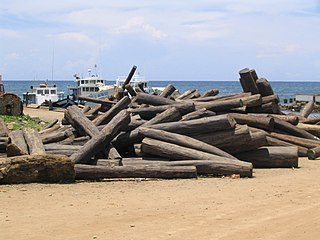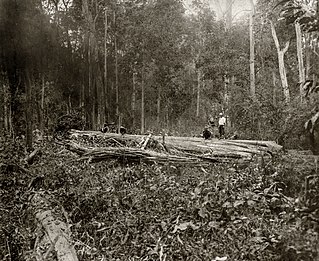Related Research Articles

Teak is a tropical hardwood tree species in the family Lamiaceae. It is a large, deciduous tree that occurs in mixed hardwood forests. Tectona grandis has small, fragrant white flowers arranged in dense clusters (panicles) at the end of the branches. These flowers contain both types of reproductive organs. The large, papery leaves of teak trees are often hairy on the lower surface. Teak wood has a leather-like smell when it is freshly milled and is particularly valued for its durability and water resistance. The wood is used for boat building, exterior construction, veneer, furniture, carving, turnings, and various small projects.

Illegal logging is the harvest, transportation, purchase, or sale of timber in violation of laws. The harvesting procedure itself may be illegal, including using corrupt means to gain access to forests; extraction without permission, or from a protected area; the cutting down of protected species; or the extraction of timber in excess of agreed limits. Illegal logging is a driving force for a number of environmental issues such as deforestation, soil erosion and biodiversity loss which can drive larger-scale environmental crises such as climate change and other forms of environmental degradation.

The Goldman Environmental Prize is a prize awarded annually to grassroots environmental activists.

Forestry laws govern activities in designated forest lands, most commonly with respect to forest management and timber harvesting. Forestry laws generally adopt management policies for public forest resources, such as multiple use and sustained yield. Forest management is split between private and public management, with public forests being sovereign property of the State. Forestry laws are now considered an international affair.

Environmental crime is an illegal act which directly harms the environment. These illegal activities involve the environment, wildlife, biodiversity, and natural resources. International bodies such as, G7, Interpol, European Union, United Nations Environment Program, United Nations Interregional Crime and Justice Research Institute, have recognized the following environmental crimes:

The Environmental Investigation Agency (EIA) is an international NGO founded in 1984 in the United Kingdom by environmental activists Dave Currey, Jennifer Lonsdale and Allan Thornton. At present, it has offices in London and Washington, D.C. The EIA covertly investigates and campaigns against environmental crime and abuse.

Deforestation in Cambodia has increased in recent years. Cambodia is one of the world's most forest endowed countries, that was not historically widely deforested. However, massive deforestation for economic development threatens its forests and ecosystems. As of 2015, the country has one of the highest rates of deforestation in the world.

The environment of Brazil is characterized by high biodiversity with a population density that decreases away from the coast.
Sapo National Park is a national park in Sinoe County, Liberia. It is the country's largest protected area of rainforest, was the first national park established in the country, and contains the second-largest area of primary tropical rainforest in West Africa after Taï National Park in neighbouring Côte d'Ivoire. Agriculture, construction, fishing, hunting, human settlement, and logging are prohibited in the park.

Fern is a Dutch foundation created in 1995. It is an international Non-Governmental Organization (NGO) set up to keep track of the European Union's (EU) involvement in forests and coordinate NGO activities at the European level. Fern works to protect forests and the rights of people who depend on them.

The Amazon rainforest, spanning an area of 3,000,000 km2, is the world's largest rainforest. It encompasses the largest and most biodiverse tropical rainforest on the planet, representing over half of all rainforests. The Amazon region includes the territories of nine nations, with Brazil containing the majority (60%), followed by Peru (13%), Colombia (10%), and smaller portions in Venezuela, Ecuador, Bolivia, Guyana, Suriname, and French Guiana.
Timber mafia refers to organized crime in the field of illegal logging in timber.

Rates and causes of deforestation vary from region to region around the world. In 2009, two-thirds of the world's forests were located in just 10 countries: Russia, Brazil, Canada, the United States, China, Australia, the Democratic Republic of the Congo, Indonesia, India, and Peru.

Deforestation in Indonesia involves the long-term loss of forests and foliage across much of the country; it has had massive environmental and social impacts. Indonesia is home to some of the most biologically diverse forests in the world and ranks third in number of species behind Brazil and the Democratic Republic of Congo.

Deforestation in Papua New Guinea has been extensive and in recent decades from 2001 to 2020, Papua New Guinea (PNG) lost 1.57Mha of tree cover, equivalent to a 3.7% decrease in tree cover since 2000, and 1.15Gt of CO₂e emissions.

As in other Southeast Asian countries, deforestation in the Philippines is a major environmental issue. Over the course of the 20th century, the forest cover of the country dropped from 70 percent down to 20 percent. Based on an analysis of land use pattern maps and a road map an estimated 9.8 million hectares of forests were lost in the Philippines from 1934 to 1988.

Deforestation in Myanmar led to a reduction in forest cover from 70% of the country in 1948 to 48% by 2014. Myanmar possesses the largest expanse of tropical forest in mainland Southeast Asia, which contains high biodiversity. As of 2010, Myanmar's living forest biomass held 1,654 million metric tons of carbon and over 80 endemic species.
The European Union Forest Law Enforcement, Governance and Trade Action Plan is a European Union initiative to address illegal logging and the social, economic and environmental harm it causes. The EU adopted the Action Plan in 2003. The plan includes activities in the EU and in tropical countries that export timber and timber products to the EU. These measures include a regulation that prohibits EU businesses from importing or trading illegal timber, and bilateral trade agreements with timber-exporting countries. Much of the FLEGT Action Plan focuses on promoting trade in legal timber products and creating disincentives for trade in illegal products. However, the Action Plan's measures go further by addressing aspects of poor governance that enable illegal logging to persist.
The European Union Timber Regulation (EUTR) aims to counter illegal logging and associated trade in timber and timber products in the member states of the European Union, and ultimately contribute to sustainable management of forests and reduced emissions from deforestation and forest degradation beyond EU borders. The EUTR establishes obligations on 'operators' who place timber and timber products on the market and on 'traders' who buy or sell timber or timber products already on the internal market.

Leng Ouch is a Cambodian climate activist. He spent his early childhood in the forests in Cambodia and became an activist against illegal logging in Cambodia's forests. He is best known for going undercover to record illegal logging activities in his home country.
References
- ↑ Nijhuis, Michelle (25 April 2006). "Silas Siakor put his life on the line to save Liberia's forests". Grist . Retrieved 6 May 2018.
- ↑ Perry, Alex (24 September 2008). "Silas Kpanan'Ayoung Siakor". Time . Retrieved 6 May 2018.
- ↑ "Silas Siakor. 2006 Goldman Prize Recipient Africa". goldmanprize.org. Retrieved 6 May 2018.
- ↑ "Silas Kpanan'Ayoung Siakor | Al Jazeera News | Today's latest from Al Jazeera". www.aljazeera.com. Retrieved 2023-04-20.
- ↑ "Silas". www.tiff.net. Retrieved 6 May 2018.
- ↑ "Silas Siakor - Goldman Environmental Prize". 2022-03-18. Retrieved 2023-04-20.
- ↑ "Silas Siakor Calls for Stricter Enforcement of EU Logging Regulations - Goldman Environmental Prize". 2014-03-25. Retrieved 2023-04-20.
- ↑ PERRY, ALEX (2008-09-24). "Heroes of the Environment 2008 - TIME". Time. ISSN 0040-781X . Retrieved 2023-04-20.
- ↑ "Silas Siakor - Goldman Environmental Prize". 2022-03-18. Retrieved 2023-04-20.
- ↑ "Silas Siakor Calls for Stricter Enforcement of EU Logging Regulations - Goldman Environmental Prize". 2014-03-25. Retrieved 2023-04-20.